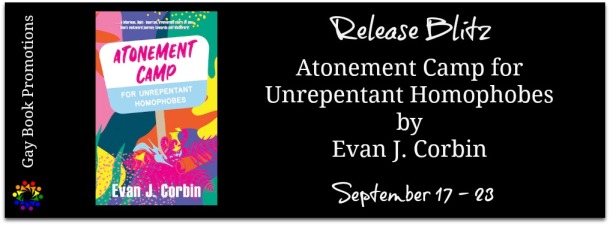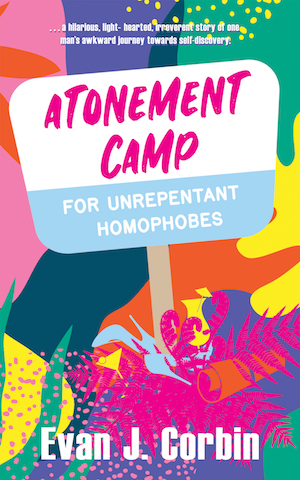RELEASE BLITZ

Book Title: Atonement Camp for Unrepentant Homophobes
Author: Evan J. Corbin
Publisher: Atonement Book, LLC
Cover Artist: The Book Cover Whisperer
Release Date: September 3, 2020 for the print book and September 17, 2020 for the eBook.
Genre/s: Contemporary LGBTQ Fiction; Speculative Fiction; Humour
Trope/s: Fish-out of water comedy
Themes: Coming out, cultural assimilation
Heat Rating: 2 flames
Length: 70 600 words/ 283 pages
Buy Links - Available in Kindle Unlimited and Paperback

Atonement Camp.
Pastor Harris is only going to save his career.
But while he doesn’t want to be there, a change of heart may be just what he needs...
Blurb
The oldest translation of a Gospel is returned to the world by a secret society long dedicated to its preservation. In it, Jesus explicitly condemns bigotry and homophobia. In a new world in which LGBTQ passengers receive preferential boarding for flights and the United States has elected its first lesbian President, Pastor Rick Harris is stalwart, closeted preacher who doggedly holds onto his increasingly unpopular convictions.
When an incendiary sermon goes too far and offends an influential family, Rick makes a painful choice to keep his job: He attends an atonement camp run by drag queens for society’s most unrepentant and terminally incurable homophobes.
Atonement Camp is immersion therapy for Pastor Harris, and it might be working. An open bar with pedicures, a devastatingly attractive roommate and an endless supply of glitter help him manage to make new friends. Soon, Rick and his cohorts learn the camp may hold its own secrets. Amid the smiling faces and scantily clad pool boys who staff the camp, a clandestine group plots to discredit the New Revelation and everything it stands for.
If Rick has the conviction to confront his own hypocrisy, he might be able to uncover the conspirators with help from his adopted flock—and find new truths within himself.
Excerpt
Chapter 1
Northern Syria
It was just after sunrise. The call to prayer from the nearby city’s rooftop loudspeakers receded as Dr. Michael Donahue’s driver left a familiar road for the makeshift trails that led deep into the desert. One faith bridged to the next, he thought. Before long, he wouldn’t need the light jacket, but he wore it anyway. It was a mysterious quest, and he tugged the jacket tight around his chest.
The jeep bounced over the rough terrain as Dr. Donahue carefully poured hot water from his thermos over his yerba mate leaves. His second mate would be less bitter than the first. Each time he made a fresh tea, the leaves lost more of their bitterness to the boiling water. The same leaves could be used again and again any given morning. It reminded him of his profession. Archeology was the sober study of the forgotten—people who lived, laughed, suffered, and died, their history diluted by each passing year. Dr. Donahue was determined to learn as much as he needed to reanimate their past with subtle detail, adding context to what would otherwise be merely more than a list of dates and details for his undergraduates to memorize before a test.
As promised, a man stood by the still-empty dig site. He was dressed in a Western style—no keffiyeh or other head dressing. With short sleeves and rugged boots, his attire was more practical than fashionable. Dr. Donahue always appreciated utility and function above much else. He acknowledged that his estimation of the man’s credibility was thus-far unearned, but he nonetheless felt more comfortable in the company of the familiar.
The site had been Dr. Donahue’s home for most of the past year. His team would return after Ramadan. Dr. Donahue’s research specialization centered almost primarily around the early Christian era. He took a certain guilty pleasure in casually admitting his atheism each semester to the newest crop of freshman at his university in Washington, D.C. Like all things, he saw it as a learning opportunity. One is not excused from understanding something just because they don’t agree with it, he’d remind them. The site itself was an early Christian refuge under the Roman Empire. Forgotten by time, but now rediscovered. Painstakingly, he and his team would uncover artifacts and consider what stories they told about the people who made them. Dust from the jeep’s tires made a gritty fog that enveloped the air. Dr. Donahue squinted, his eyes already dry. He coughed and plodded through the sand to the man silently awaiting his arrival.
“Dr. Donahue.” The professor extended his hand to the stranger.
The man took his hand and smiled. “Thank you for coming. Your research associate mentioned your name last year when he worked with us, and we immediately knew we needed to meet with you.”
Dr. Donahue fanned the remaining traces of the sand from his face. “We?”
The man flashed a half smile. “Consider us like yourself, Professor. Archeologists.”
“I would assume, but that doesn’t answer my question.”
The man chuckled. “By the end of the day, I expect that to change. Come. Follow me,” he beckoned.
Still confused, the professor followed the man down the makeshift stairs to the dig site.
“We’re not certain where it was found,” the man said, waving his arm over the site, “but this is likely close and as good a spot as any.”
“What, exactly, was found?”
The man frowned. “Technically, it was never lost. Let me be more precise. This is where it will be rediscovered.”
The professor felt his frustration growing. “What, and by whom?”
The man turned to face the professor, still smiling. “The oldest copy of the Gospel of Mark ever discovered. I’m what we refer to as a Custodian—a group of people committed to protecting this draft as we have done for more generations than our history may account for.”
The professor’s jaw dropped. He looked for answers in the man’s eyes to questions he could not manage to formulate.
“Every truth has its season, professor,” the man said, lowering himself to sit next on an empty crate near an assortment of digging tools. “This region has been plagued with war. We fear that if the artifact is not returned to the world now, it may never be.”
If his research associate hadn’t already vouched so strongly for the meeting, the professor was certain he would have already left the madman in another cloud of obscuring sand. Instead he asked: “Why have you kept it in the first place?”
“It contains a passage not found in any modern text. What’s the American expression? ‘One man’s waste is another man’s treasure’? That’s how our forefathers saw it. They saw something worthy of protection until the world was ready for the message. That time is now.”
Dr. Donahue smiled. His birthday was the following week, and the realization that his research associate might have set this up as an elaborate practical joke began to seem like the most likely explanation. It wouldn’t be out of character for him, he thought.
“So, where is it?” he asked, playing along.
The man pointed to a black chest. Taking the bait, Dr. Donahue carefully lifted the lid, expecting some puppet to pop out and exclaim “Happy Birthday!” Instead, the heavy lid creaked open to reveal a scroll bound in plastic and wound over on itself. His smile faded. Even without the aid of his radiocarbon dating equipment, he could tell the document was old. Very, very old.
About the Author
Evan is a member of the LGBTQ community who fancies himself as a playboy socialite, living in Philadelphia, Pennsylvania. Between work and lucid moments of sobriety, he writes a little. His debut novel is a light-hearted work that still manages to confront religious hypocrisy and contemporary LGBTQ struggles to balance their loss of culture with new-found civil rights. His friends say the book is great! Hopefully, you will as well.
Social Media Links



No comments:
Post a Comment